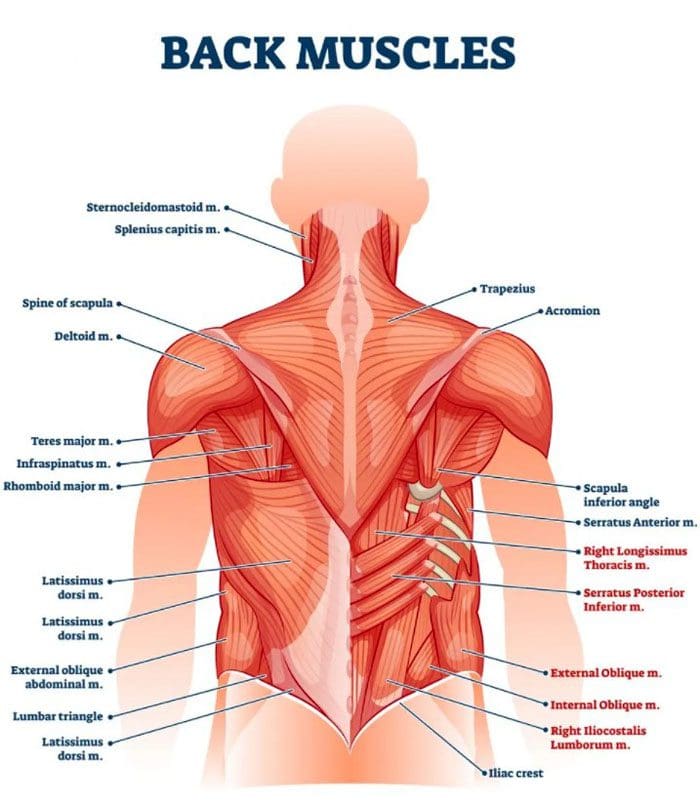Studies have found that individuals who consume alcohol in moderation have lower inflammation markers than individuals who do not drink alcohol or heavy drinkers. Other studies have found that alcohol abuse can be associated with chronic back pain. Chronic back pain can lead to alcohol dependency; however, regular alcohol over-consumption can contribute to back pain. The role of alcohol when it comes to back pain is a complicated situation because of the variables. There are social drinkers, weekend bingers, etc. Most individuals want answers to questions like:
- Will consuming alcohol cause back pain?
- Can alcohol affect sciatica?
- Why does it hurt in the back after drinking?

Table of Contents
Alcohol and Back Pain
Alcohol’s role in back pain can take on different forms, both healthy and harmful, as aforementioned individuals that consume light to moderate amounts of alcoholic beverages have reduced inflammation throughout the body compared to heavy drinkers or those who don’t drink. Another consideration is that many individuals with back pain take medication/s. This can present a series of issues when mixed with alcohol. Most individuals with back pain can drink in moderation. But this is easier said than done because many do not understand the medical definition of moderate drinking.
Moderate Drinking
Moderate drinking is defined as up to one drink a day for women and up to 2 drinks a day for men. A standard drink in the United States is a drink that contains around 0.6 fluid ounces/14 grams of pure alcohol. Alcoholic beverages can vary in terms of how much alcohol they contain. A few examples of different alcoholic beverages that contain the same amount of alcohol and count as one drink:
- 12-fluid-ounce regular beer contains 5% alcohol
- 5-fluid-ounce glass of wine contains 12% alcohol
- 1.5-fluid-ounce glass of 80-proof distilled spirits contains 40% alcohol
Medical professionals and national health advisory boards agree in general that moderate drinking is the healthy way to consume alcohol. However, some individuals should avoid alcohol completely, specifically if taking pain medication/s for spine problems/conditions.
Medication
Medications, even over-the-counter types like ibuprofen, can cause serious issues when combined with alcohol. Some common back pain medications can create unfavorable reactions when alcohol enters the system:
- Alcohol and acetaminophen can lead to liver failure.
- Alcohol mixed with aspirin increases gastric bleeding risk.
- Alcohol increases the analgesic and sedative effects of opiates.
For those taking medication/s for back pain, there needs to be an understanding of how alcohol interacts with the medication/s. Keeping track of the drug warnings can be challenging, especially if taking multiple medications. It is recommended to follow the expertise of local pharmacists and personal doctors. They will provide an explanation and an understanding of how the medications work together and if alcohol can be safely consumed in moderation or should be avoided.
Drinking The Pain Away
One benefit of moderate drinking is that it can help the body relax and reduce stress. This can help manage and prevent back pain. However, it is estimated that around 28% of individuals with chronic pain begin to turn to alcohol to manage the pain. This can lead to various problems.
- Alcohol’s pain-numbing effects activate when drinking beyond the recommended moderate drinking. This can lead to excessive alcohol consumption.
- The more alcohol consumed to relieve pain, the more likely a tolerance will develop that can lead to dependence.
However, chronic drinking to dull back pain can cause the body to develop increased sensitivity to pain. If there is withdrawal from alcohol after months or years of use, an individual may feel pain to a greater degree than before. Because of this, many go back to drinking for pain management. Excessive use can cause significant health issues.
Spinal Health
Having an honest conversation about drinking individual habits with a personal doctor is the recommended way to protect your body’s overall health safely. A doctor will help explain how alcohol relates to the individual, as they best understand how alcohol affects their specific spinal condition and how it interacts with treatment.
Compositional Testing
Alcohol Consumption and Body Composition
Alcohol can be included as part of a healthy diet and achieve the body that an individual is working towards. When drinking, try to remember the following:
- The metabolism of alcohol does affect fat metabolism.
- Try to avoid consuming excessive calories to prevent fat storage.
- If drinking regularly, take alcohol into account, with the usual caloric intake.
- If trying to maximize time spent in the gym, limit sugary mixers and cocktails.
- When choosing beer, stick to lighter versions.
- Keep calories in check by choosing low-calorie spirits.
- Be sure to eat plenty of lean protein to feel full and satisfied.
- Stay hydrated
- Get to sleep on time.
- Drink responsibly.
- Excessive levels of alcohol are never healthy.
References
Ferreira PH, Pinheiro MB, Machado GC, Ferreira ML. Is alcohol intake associated with low back pain? A systematic review of observational studies. Man Ther. 2013;18(3):183-90. doi: 10.1016/j.math.2012.10.007.
Imhof A, Woodward M, Doering N, et al. Overall alcohol intake, beer, wine, and systemic markers of inflammation in western Europe: results from three MONICA samples (Augsburg, Glasgow, Lille). Eur Heart J. December 2004;25(23):2092-2100.
Rethinking Drinking: Alcohol and Your Health. National Institutes of Health: U.S. Department of Health and Human Services. https://www.rethinkingdrinking.niaaa.nih.gov/. Accessed March 30, 2018.
Post Disclaimer
Professional Scope of Practice *
The information herein on "Alcohol And Back Pain" is not intended to replace a one-on-one relationship with a qualified health care professional or licensed physician and is not medical advice. We encourage you to make healthcare decisions based on your research and partnership with a qualified healthcare professional.
Blog Information & Scope Discussions
Welcome to El Paso's Premier Wellness, Personal Injury Care Clinic & Wellness Blog, where Dr. Alex Jimenez, DC, FNP-C, a Multi-State board-certified Family Practice Nurse Practitioner (FNP-BC) and Chiropractor (DC), presents insights on how our multidisciplinary team is dedicated to holistic healing and personalized care. Our practice aligns with evidence-based treatment protocols inspired by integrative medicine principles, similar to those found on this site and our family practice-based chiromed.com site, focusing on restoring health naturally for patients of all ages.
Our areas of multidisciplinary practice include Wellness & Nutrition, Chronic Pain, Personal Injury, Auto Accident Care, Work Injuries, Back Injury, Low Back Pain, Neck Pain, Migraine Headaches, Sports Injuries, Severe Sciatica, Scoliosis, Complex Herniated Discs, Fibromyalgia, Chronic Pain, Complex Injuries, Stress Management, Functional Medicine Treatments, and in-scope care protocols.
Our information scope is multidisciplinary, focusing on musculoskeletal and physical medicine, wellness, contributing etiological viscerosomatic disturbances within clinical presentations, associated somato-visceral reflex clinical dynamics, subluxation complexes, sensitive health issues, and functional medicine articles, topics, and discussions.
We provide and present clinical collaboration with specialists from various disciplines. Each specialist is governed by their professional scope of practice and their jurisdiction of licensure. We use functional health & wellness protocols to treat and support care for musculoskeletal injuries or disorders.
Our videos, posts, topics, and insights address clinical matters and issues that are directly or indirectly related to our clinical scope of practice.
Our office has made a reasonable effort to provide supportive citations and has identified relevant research studies that support our posts. We provide copies of supporting research studies upon request to regulatory boards and the public.
We understand that we cover matters that require an additional explanation of how they may assist in a particular care plan or treatment protocol; therefore, to discuss the subject matter above further, please feel free to ask Dr. Alex Jimenez, DC, APRN, FNP-BC, or contact us at 915-850-0900.
We are here to help you and your family.
Blessings
Dr. Alex Jimenez DC, MSACP, APRN, FNP-BC*, CCST, IFMCP, CFMP, ATN
email: coach@elpasofunctionalmedicine.com
Multidisciplinary Licensing & Board Certifications:
Licensed as a Doctor of Chiropractic (DC) in Texas & New Mexico*
Texas DC License #: TX5807, Verified: TX5807
New Mexico DC License #: NM-DC2182, Verified: NM-DC2182
Multi-State Advanced Practice Registered Nurse (APRN*) in Texas & Multi-States
Multistate Compact APRN License by Endorsement (42 States)
Texas APRN License #: 1191402, Verified: 1191402 *
Florida APRN License #: 11043890, Verified: APRN11043890 *
License Verification Link: Nursys License Verifier
* Prescriptive Authority Authorized
ANCC FNP-BC: Board Certified Nurse Practitioner*
Compact Status: Multi-State License: Authorized to Practice in 40 States*
Graduate with Honors: ICHS: MSN-FNP (Family Nurse Practitioner Program)
Degree Granted. Master's in Family Practice MSN Diploma (Cum Laude)
Dr. Alex Jimenez, DC, APRN, FNP-BC*, CFMP, IFMCP, ATN, CCST
My Digital Business Card
RN: Registered Nurse
APRNP: Advanced Practice Registered Nurse
FNP: Family Practice Specialization
DC: Doctor of Chiropractic
CFMP: Certified Functional Medicine Provider
MSN-FNP: Master of Science in Family Practice Medicine
MSACP: Master of Science in Advanced Clinical Practice
IFMCP: Institute of Functional Medicine
CCST: Certified Chiropractic Spinal Trauma
ATN: Advanced Translational Neutrogenomics





 Again, We Welcome You.
Again, We Welcome You.
Comments are closed.